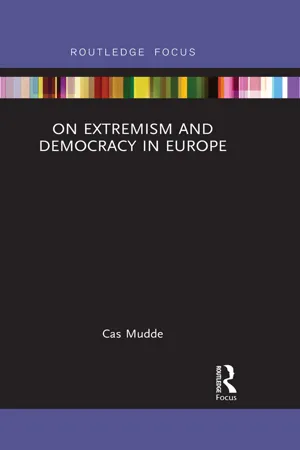But is the ideological core of the populist radical right – defined as a combination of nativism, authoritarianism and populism – indeed at odds with the basic values of western societies? And are populist radical right values really shared by only a tiny minority of the European population?
The ideological
The key feature of the populist radical right ideology is nativism: an ideology which holds that states should be inhabited exclusively by members of the native group (‘the nation’) and that non-native elements (persons and ideas) are fundamentally threatening to the nation-state’s homogeneity. Nativist thinking has a long history in western societies, notably in the US, with movements like the Know Nothings dating back to the early nineteenth century.
Historically and ideologically, nativism is closely linked to the idea of the nation-state, a nationalist construction that has become a cornerstone of European and global politics. The idea of the nation-state holds that each nation should have its own state and, although this is often left implicit, each state should have its own, single nation. Various European constitutions stipulate that their state is linked to one specific nation; for example, the Slovak preamble starts with ‘We, the Slovak nation,’ while article 4.1 of the Romanian constitution states that ‘the foundation of the state is based on the unity of the Romanian people.’ The idea of national self-determination is even enshrined in Chapter 1, article 1 of the United Nations Charter, which explicitly calls for respect for the ‘self-determination of peoples.’
This is not to claim that all references to national self-determination are necessarily expressions of nativism. For example, article 1 of the Constitution of Ireland states:
The Irish nation hereby affirms its inalienable, indefeasible, and sovereign right to choose its own form of Government, to determine its relations with other nations, and to develop its life, political, economic and cultural, in accordance with its own genius and traditions.
However, further articles express a fairly open attitude to non-natives, including ‘the firm will of the Irish Nation, in harmony and friendship, to unite all the people who share the territory of the island of Ireland, in all the diversity of their identities and traditions’ (article 3).
But even where European states are not nativist, they will use ‘banal nationalism,’ a term used by the British sociologist Michael Billig to refer to everyday ‘ideological habits which enable the established nations of the West to be reproduced.’8 Citizens in western countries are daily reminded of their ‘national identity’ through a plethora of more and less subtle hints, ranging from the celebration of Independence Day, through the name of media outlets (e.g. Irish Times, British Broadcasting Corporation, Hrvatska Radio Televizija), to history education in schools. Although banal reminders, they are based on the constituting idea of the nation-state.
Authoritarianism, the belief in a strictly ordered society in which infringements of authority are to be punished severely, is not exclusive to the core of populist radical right ideology. Most notably, ‘love and respect for authority,’ a euphemistic description of authoritarianism, is considered to be a core staple of conservatism. Moreover, authoritarianism is a key aspect of both secular and religious thinking, ranging from (proto-)liberals like Thomas Hobbes to socialists like Vladimir Ilyich Lenin, and from Roman Catholicism to Orthodox Christianity.
The third and final feature is populism, here defined as a thin-centred ideology that considers society to be ultimately separated into two homogeneous and antagonistic groups, ‘the pure people’ versus ‘the corrupt elite.’ It argues that politics should be an expression of the volonté générale, i.e. the general will of the people. While the populist ideology has much deeper roots in the US than in (Western) Europe, key elements are clearly linked to fundamental values of western societies in general.
Democracy has a redemptive and a pragmatic side: the former emphasizes the idea (l) of vox populi vox dei – or ‘government of the people, by the people, for the people’ – the latter the importance of institutions. As the British political theorist Margaret Canovan has argued, ‘inherent in modern democracy, in tension with its pragmatic face, is faith in secular redemption: the promise of a better world through action by the sovereign people.’9 Populism builds upon this ‘democratic promise.’ Interpreting ‘the people’ as a homogenous moral entity, populists argue that the common sense of the people should always take precedence and cannot be curtailed by ‘undemocratic’ institutional constraints such as constitutional protection of minorities.
Populism’s anti-establishment sentiments are closely connected to broadly shared beliefs in western societies. These range from Lord Acton’s famous adagio ‘power corrupts’ to the negative image of humanity so essential to Christianity (e.g. in the Original Sin). Indeed, the fact that Evangelical Christianity plays a much greater role in US culture and politics than in Europe might be part of the explanation of the broader and deeper anti-establishment sentiments in that country. Moreover, whereas the process of democratization and state formation in much of Western Europe was more elite-driven, based upon a strong central authority and an elitist distrust of the people, in the US the same processes were driven, at least in the dominant national narrative, by ‘We, the People of the United States,’ and by a distrust in central government shared by both the masses and the elites, including the Founding Fathers.
